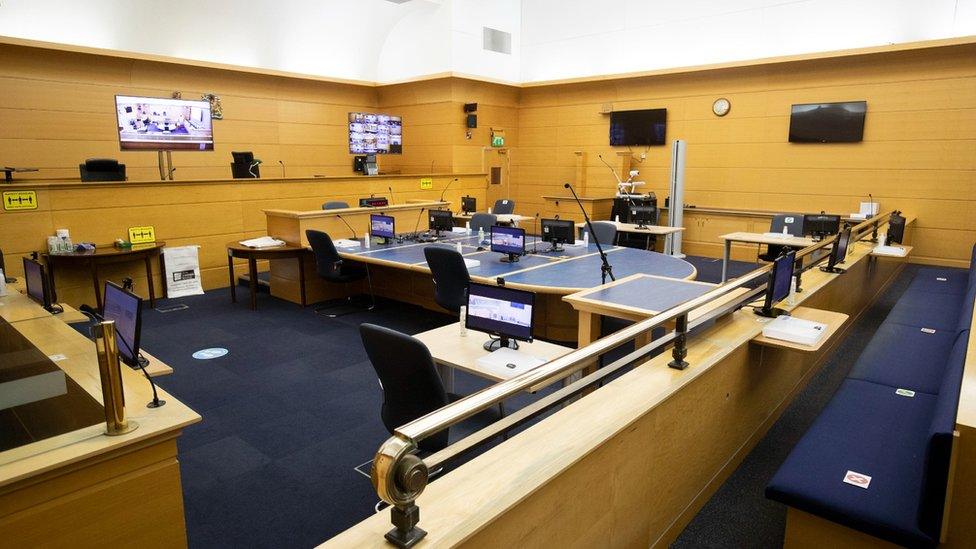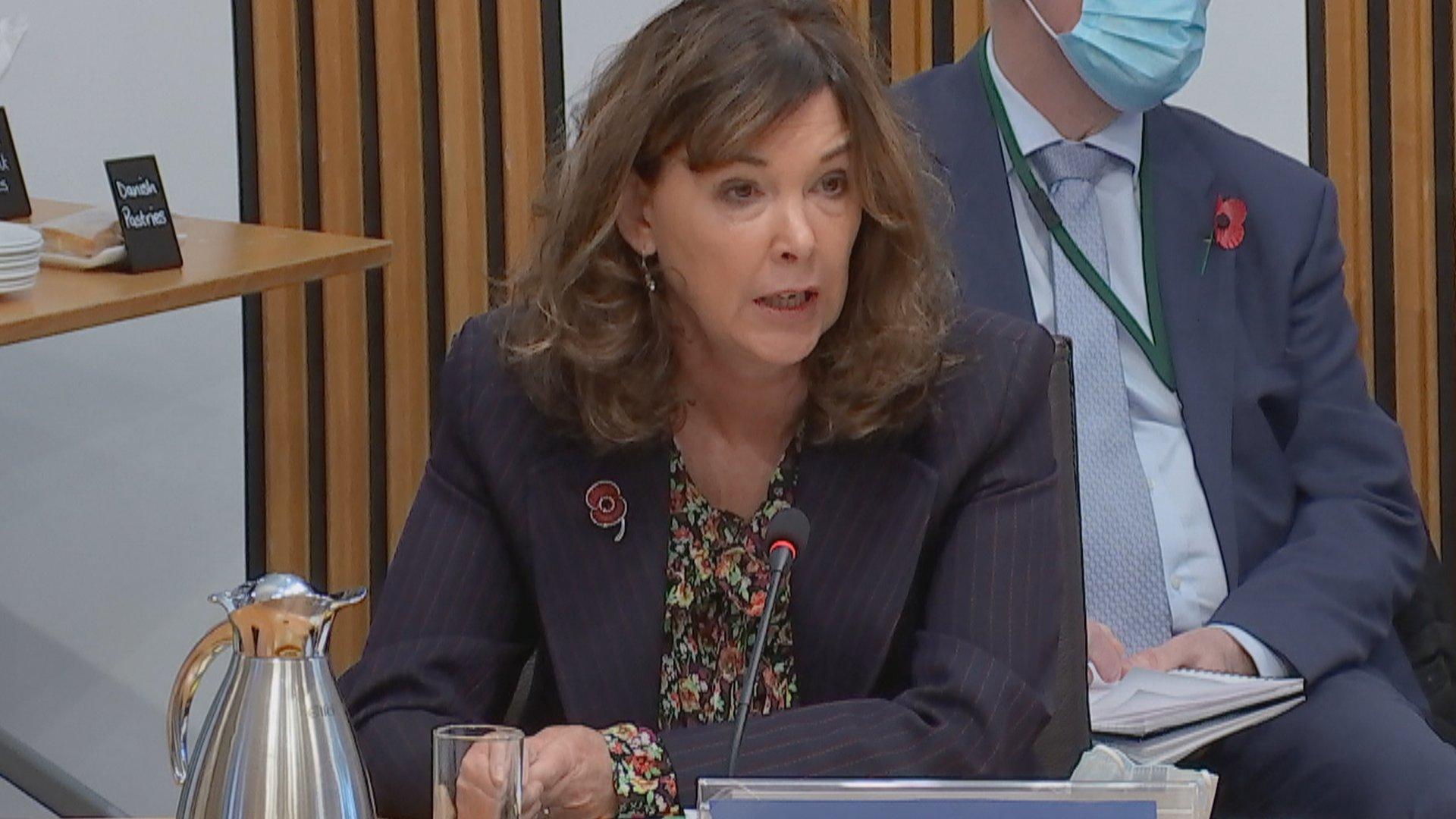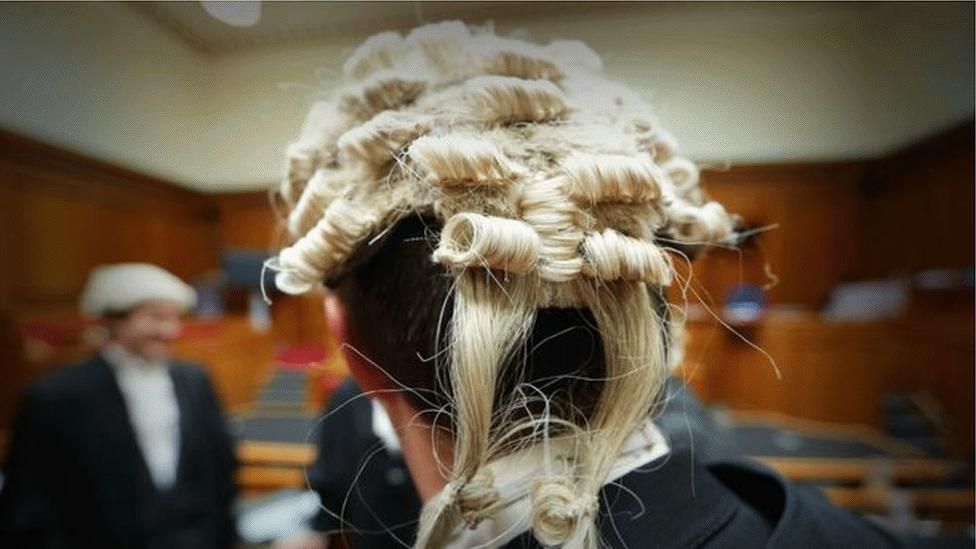Women asking to drop domestic abuse cases over delays
- Published
Jordana Rutherford waited two years and five months for her ex-boyfriend to be convicted
Victims of domestic abuse and sexual assault are asking to drop their cases because court delays are so long, according to a report seen by the BBC.
Women and children are having to wait years for cases to conclude and are left without adequate protection while they wait for a court date, it said.
The report was written for the Scottish government's Victims Taskforce.
It details repeated adjournments and administrative delays, with cases regularly taking two years.
WARNING - This story contains graphic images of the results of violence.
The report said women were not properly protected by Non-Harassment Orders and repeated bail breaches by the accused were being ignored.
The victims' experiences were collated by Victim Support, Women's Aid, Rape Crisis Scotland, Children 1st and specialist support service Assist.
The ultimate decision on whether to proceed with cases lies with the prosecution service but they have to take into account the views of the victim.
The Scottish government said it was trying to reduce the court backlog caused by the pandemic and was working to protect victims.

'Nobody deserves to wait that long'

Jordana Rutherford was beaten up on a night out by her ex-boyfriend
Jordana Rutherford was 17 when she was beaten by her ex-boyfriend on a night out in November 2019. She still bears the scars.
Now 20, she had to wait two years and five months to see her ex found guilty.
Jordana said the repeated court delays were a nightmare.
"I felt like dropping the case. I felt there was no point trying to be heard," she said.
"I felt sick to my stomach. Nobody deserves to wait that long."
She did not feel safe because her ex-boyfriend was released on bail while the case was waiting to be heard.
"There could never be a day when I could just live and not remember, not only because of the ongoing court case, but to then think: 'Oh my god, I might bump into him'."
She said she was only speaking out now because he had been found guilty and she wanted to encourage others to persevere with their cases.
"To anyone else in a similar situation, please don't stop trying to get your justice. Keep fighting for it."

The backlog in court cases because of Covid has been well documented. The Scottish Court Service has said it will not be cleared until at least 2025.
Official figures show as of the end of last year there were 6,547 domestic abuse trials scheduled - but experts said the figures did not reflect the time people have to wait and the repeated adjournments.
The Scottish government said domestic abuse cases would be prioritised once courts reopened after the first lockdown.
The courts were meant to be using virtual trials to help clear the backlog, but the report said that was happening very rarely in domestic abuse cases.
'Tip of the iceberg'
This is the first time a report has been put together detailing the concerns of these victims.
Fiona McMullen, of Assist, told the BBC cases which used to take 12 weeks were now taking two years.
"What you see at court is just the tip of the iceberg," she said.
"For most of these cases the abuse has been going on for years before they make a report."
Ms McMullen said that repeated scheduling and adjournment of trials was almost worse for the victim than not having a date in the first place.
"Victims and children find the waiting excruciating and ask to abandon cases when they would not have done that before," she said.
Ms McMullen said the fact that people wanted to turn their back on the justice system after the trauma of reporting abuse reflected how serious the impact of the delays was.
She said many victims were not being granted Non-Harassment Orders, so felt they had put themselves and their families at even greater risk by reporting to the police.
Ms McMullen also said there had been multiple breaches of bail without the person being remanded in custody.
In the report, Rape Crisis Scotland said six victims had withdrawn their cases and a further 12 did not report what happened to them to the police because of the delays in the system.
The report quotes a Women's Aid worker saying many women want to move on their lives and do not wish to be re-traumatised or to risk escalation by bringing everything back up in court.

The report also noted cases of accused people and perpetrators using Covid to adjourn, for example falsely claiming they have to self-isolate to get out of appearing at court.
Justice Secretary Keith Brown said Scotland had backlogs, like many other jurisdictions, but that he was committed to dealing with domestic abuse and had allocated funds to help victims.
He added that domestic abuse cases were a priority.
Mr Brown said: "They are dealt with on average much more quickly and more of them are dealt with in the court system, which I think does show - even in these very difficult times - our commitment to dealing with domestic abuse."
A spokesman for the Crown Office said: "Scotland's prosecutors work with justice partners to ensure victims are treated with dignity and respect, and that cases progress as efficiently as possible."
A spokesman for the Scottish Courts and Tribunals Service said the latest figures showed that domestic violence cases accounted for a third of all Sheriff Summary trials.
He said: "The recovery programme which commenced in September allowed us to run an additional 4 High court trials, 2 sheriff and jury trials and 10 sheriff summary trials daily, utilising existing available capacity across the court estate.
"We continue to work with all justice partners to limit the time cases take to get to court and to tackle the backlog."
Related topics
- Published3 November 2021

- Published28 September 2020
